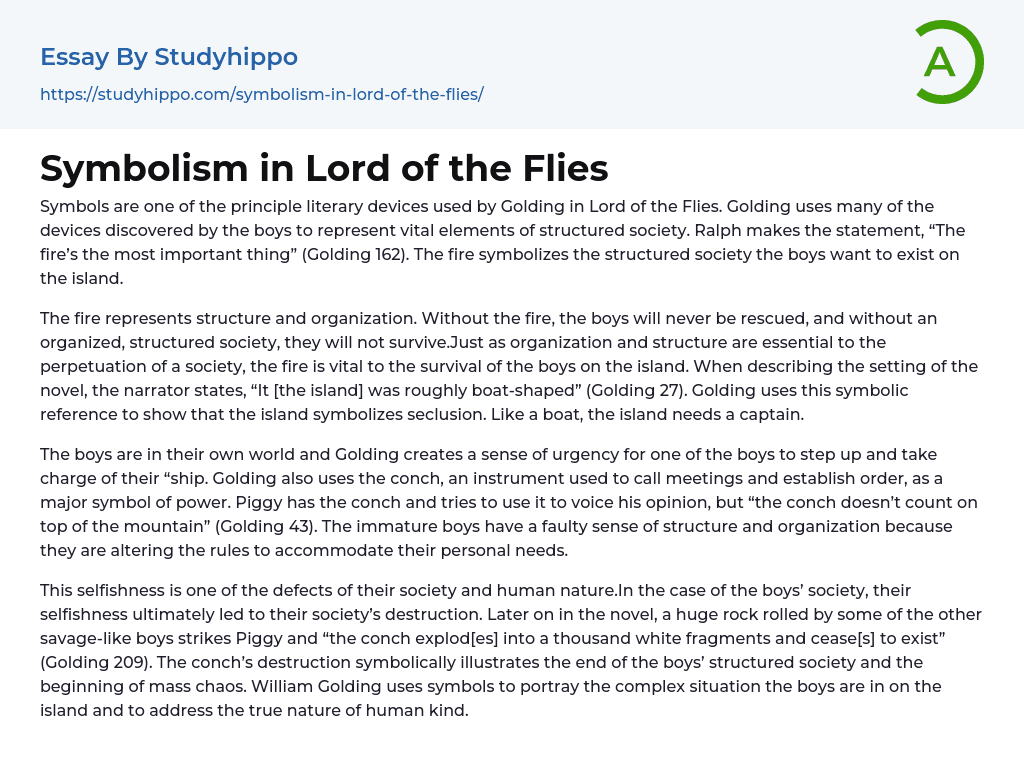Symbols are one of the principle literary devices used by Golding in Lord of the Flies. Golding uses many of the devices discovered by the boys to represent vital elements of structured society. Ralph makes the statement, “The fire’s the most important thing” (Golding 162). The fire symbolizes the structured society the boys want to exist on the island.
The fire represents structure and organization. Without the fire, the boys will never be rescued, and without an organized, structured society, they will not survive.Just as organization and structure are essential to the perpetuation of a society, the fire is vital to the survival of the boys on the island. When describing the setting of the novel, the narrator states, “It [the island] was roughly boat-shaped” (Golding 27). Golding uses this symbolic re
...ference to show that the island symbolizes seclusion. Like a boat, the island needs a captain.
The boys are in their own world and Golding creates a sense of urgency for one of the boys to step up and take charge of their “ship. Golding also uses the conch, an instrument used to call meetings and establish order, as a major symbol of power. Piggy has the conch and tries to use it to voice his opinion, but “the conch doesn’t count on top of the mountain” (Golding 43). The immature boys have a faulty sense of structure and organization because they are altering the rules to accommodate their personal needs.
This selfishness is one of the defects of their society and human nature.In the case of the boys’ society, their selfishness ultimately led to their society’s destruction. Later on in the novel,
huge rock rolled by some of the other savage-like boys strikes Piggy and “the conch explod[es] into a thousand white fragments and cease[s] to exist” (Golding 209). The conch’s destruction symbolically illustrates the end of the boys’ structured society and the beginning of mass chaos. William Golding uses symbols to portray the complex situation the boys are in on the island and to address the true nature of human kind.
- Book Summary essays
- Metaphor essays
- Reader essays
- Rhyme essays
- Literary devices essays
- Villain essays
- Books essays
- Genre essays
- Literary Criticism essays
- Writer essays
- Protagonist essays
- Simile essays
- Poem essays
- Book Report essays
- Book Review essays
- Greek Mythology essays
- Plot essays
- Tragic Hero essays
- Coming of Age essays
- Play essays
- Rhetoric essays
- Rhetorical Question essays
- Translation essays
- Understanding essays
- Reason essays
- Character essays
- Letter essays
- American Literature essays
- Literature Review essays
- Utopia essays
- Poetry Analysis essays
- Dante's Inferno essays
- Between The World and Me essays
- Incidents in The Life of a Slave Girl essays
- Flowers for Algernon essays
- Myth essays
- Everyday Use essays
- Boo Radley essays
- Genesis essays
- Richard iii essays
- Alice in Wonderland essays
- On the road essays
- Ozymandias essays
- The Nightingale essays
- Holden Caulfield essays
- Animal Farm essays
- 1984 essays
- A Hanging essays
- Shooting An Elephant essays
- A Tale Of Two Cities essays




